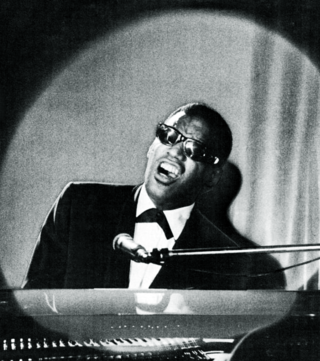
Soul music is a popular music genre that originated in the African-American community throughout the United States in the late 1950s and early 1960s. It has its roots in African-American gospel music and rhythm and blues. Soul music became popular for dancing and listening, where U.S. record labels such as Motown, Atlantic and Stax were influential during the Civil Rights Movement. Soul also became popular around the world, directly influencing rock music and the music of Africa. It also had a resurgence in the mid-to late 1990s with the subgenre neo-soul, which added modern production elements and influence from hip-hop.

The Temptations are an American vocal group from Detroit, Michigan, who released a series of successful singles and albums with Motown Records during the 1960s to mid 1970s. The group's work with producer Norman Whitfield, beginning with the Top 10 hit single "Cloud Nine" in October 1968, pioneered psychedelic soul, and was significant in the evolution of R&B and soul music. The band members are known for their choreography, distinct harmonies, and dress style. Having sold tens of millions of albums, the Temptations are among the most successful groups in popular music.
Motown is an American record label owned by the Universal Music Group. It was founded by Berry Gordy Jr. as Tamla Records on January 12, 1959, and incorporated as Motown Record Corporation on April 14, 1960. Its name, a portmanteau of motor and town, has become a nickname for Detroit, where the label was originally headquartered.

Charles Edwin Hatcher , known by his stage name Edwin Starr, was an American singer and songwriter. He is best remembered for his Norman Whitfield-produced Motown singles of the 1970s, most notably the number-one hit "War".

"I Heard It Through the Grapevine" is a song written by Norman Whitfield and Barrett Strong for Motown Records in 1966. The first recording of the song to be released was produced by Whitfield for Gladys Knight & the Pips and released as a single in September 1967. It went to number one on the Billboard R&B Singles chart and number two on the Billboard Pop Singles chart and shortly became the biggest selling Motown single up to that time.
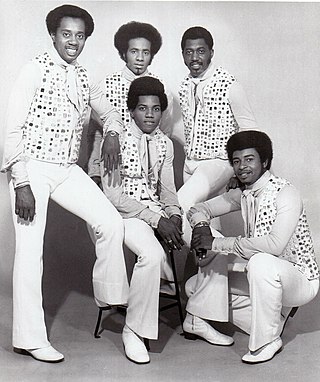
Norman Jesse Whitfield was an American songwriter and producer, who worked with Berry Gordy's Motown labels during the 1960s. He has been credited as one of the creators of the Motown Sound and of the late-1960s subgenre of psychedelic soul.
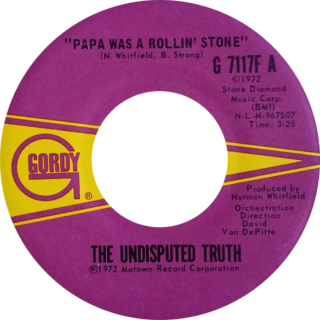
"Papa Was a Rollin' Stone" is a song originally performed by Motown recording act the Undisputed Truth in 1972, though it became much better known after a Grammy-award winning cover by the Temptations was issued later the same year. This latter version of the song became a number-one hit on the Billboard Hot 100.

"Ain't Too Proud to Beg" is a 1966 song and hit single by the Temptations for Motown Records' Gordy label, produced by Norman Whitfield and written by Whitfield and Edward Holland Jr. The song peaked at number 13 on the Billboard Pop Chart, and was a number-one hit on the Billboard R&B charts for eight non-consecutive weeks. The song's success, in the wake of the relative underperformance of the previous Temptations' single, "Get Ready", resulted in Norman Whitfield replacing Smokey Robinson, producer of "Get Ready", as the Temptations' main producer. In 2004 it finished number 94 in AFI's 100 Years...100 Songs poll thanks to its inclusion in The Big Chill soundtrack.

The Undisputed Truth was an American Motown recording act assembled by record producer Norman Whitfield to experiment with his psychedelic soul production techniques. Joe "Pep" Harris served as main lead singer, with Billie Rae Calvin and Brenda Joyce Evans on additional leads and background vocals.
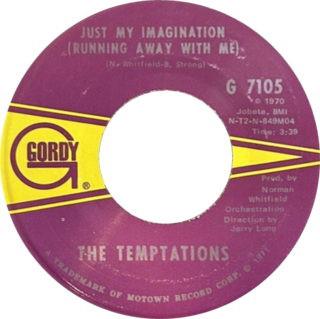
"Just My Imagination (Running Away with Me)" is a song by American soul group the Temptations, written by Norman Whitfield and Barrett Strong. Released on the Gordy (Motown) label, and produced by Norman Whitfield, it features on the group's 1971 album, Sky's the Limit. When released as a single, "Just My Imagination" became the third Temptations song to reach number one on the US Billboard Hot 100. The single held the number one position on the Billboard Pop Singles Chart for two weeks in 1971, from March 28 to April 10. "Just My Imagination" also held the number one spot on the Billboard R&B Singles chart for three weeks, from February 27 to March 20 of that year.
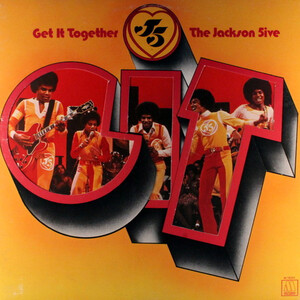
G.I.T.: Get It Together is the eighth studio album by the Jackson 5, released on September 12, 1973 for the Motown label. The album featured the minor hit "Get It Together" and the original version of the subsequent major hit "Dancing Machine", which was later re-released in edited form on a tie-in album of the same name. Get It Together has sold an estimated two million copies worldwide since its release.

Trouble Man is a soundtrack and the twelfth studio album by American soul singer Marvin Gaye, released on December 8, 1972, on Motown-subsidiary label Tamla Records. As the soundtrack to the 1972 Blaxploitation film of the same name, the Trouble Man soundtrack was a more contemporary move for Gaye, following his politically charged album What's Going On. This was the first album to be written and produced solely by Gaye. The only other album recorded under his full creative control was In Our Lifetime, released in 1981.

"I Wanna Be Where You Are" is a song written by Arthur "T-Boy" Ross and Leon Ware for Michael Jackson, who took the song to number 7 in Cash Box and number 16 on the Billboard Hot 100 pop chart. It also reached number 2 on the Billboard R&B singles chart in 1972.
Spyder Turner is an American soul singer. Turner was raised in Detroit, and sang in doo wop groups and high school choirs while young. He first began recording after winning a contest at the Apollo Theater in New York City, recording some solo sides and singing backup for several groups including The Stereophonics and The Fabulous Counts.

The Four Tops are an American vocal quartet from Detroit, Michigan. They were one of the most commercially successful American pop music groups of the 1960s and helped propel the Motown label to international fame. The group's repertoire has included aspects of soul, R&B, disco, adult contemporary, doo-wop, jazz, and show tunes.

Renaissance is a 1973 album by R&B group The Miracles on Motown Records' Tamla label. It was the first album by the group not to feature original lead singer Smokey Robinson on lead vocals, instead featuring him as executive producer. Robinson was replaced by lead singer Billy Griffin.
The Sisters Love was an American R&B and funk ensemble active in the late 1960s and early 1970s.
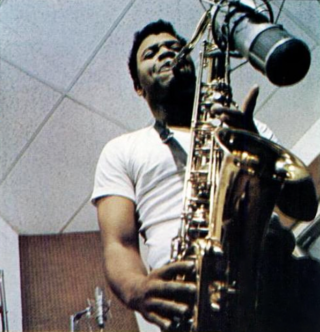
Autry DeWalt Mixon Jr., known professionally as Junior Walker, was an American multi-instrumentalist and vocalist who recorded for Motown during the 1960s. He also performed as a session and live-performing saxophonist with the band Foreigner during the 1980s.
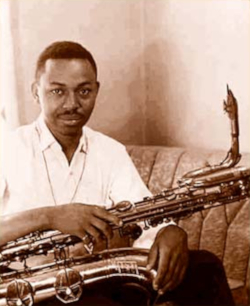
Andrew Alexander "Mike" Terry was an American saxophonist, songwriter, arranger, producer and musical director. His baritone sax solos feature on the breakthrough hits of Martha and the Vandellas, and The Supremes. As a member of the Funk Brothers he performed on thousands of Motown recordings from 1960 to 1967, including at least seven US #1 hits. As was Motown's policy at the time, none of the studio musicians were credited by name. Terry was the musical arranger of the 1966 hit "Cool Jerk" by The Capitols, and later became a record producer, with partners including George Clinton, Sidney Barnes, and Jack Ashford.

Foxy Brown is the second soundtrack and the fifth studio album by American soul musician Willie Hutch, for the film of the same name. It was released in 1974 via Motown Records.

















